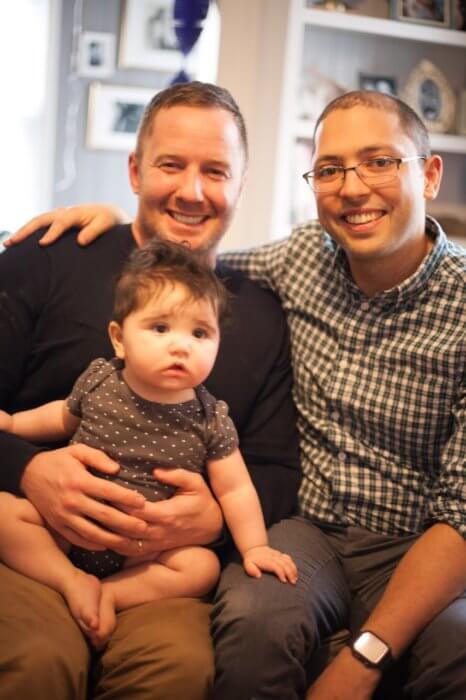Less than three weeks after a federal appellate court ruled that a child born in Canada to a gay bi-national couple — in which one father was an American citizen and his husband, the boy’s biological father, was an Israeli citizen — was an American citizen from birth, the State Department has dropped its appeals of district court rulings in two other similar cases.
On October 9, the Ninth Circuit Court of Appeals affirmed a 2019 ruling by a federal district court in California that Ethan, the second of two boys born together through surrogacy to Andrew and Elad Dvash-Banks, enjoyed the same citizenship rights as his brother Aiden, whose biological father is Andrew.
This case and the two in which the State Department dropped its appeals on October 26 all involve the interpretation of immigration law concerning the citizenship status of children born outside the US when only one of the parents is an American citizen. If a couple, both of whom are Americans, have a child outside the country that child is automatically deemed a US citizen from birth. In cases where only one parent is a US citizen, however, the State Department for many years has taken the position that the child can only be considered a US citizen from birth if the child is biologically related to the US citizen parent.
Government withdraws two appeals of district court rulings weeks after its defeat at Ninth Circuit
The State Department’s position, to date, flies in the face of what is known as the spousal parental presumption, which in its origins was a legal presumption that the husband of a woman who gives birth to a child is that child’s father for legal purposes. That presumption is now applied in US law to same-sex married couples and allows the spouse of the child’s biological mother or father to be listed as a parent on the birth certificate.
In considering the citizenship status of the two Dvash-Banks infants, who now live with their fathers in California, the State Department applied an internal policy that deemed both boys as born out of wedlock, even though their fathers were married at the time of their birth. As a result, no spousal parental presumption kicked in to benefit Ethan.
The Ninth Circuit rejected the State Department’s interpretation of immigration law, and ruled in favor of the Dvash-Banks family.
The two cases in which the State Department withdrew its appeals this week involve similar issues, but varied circumstances.
In June of this year, a federal district court in Maryland ruled that Kessem Kiviti, the daughter of two gay men, Roee and Adiel Kiviti, has been a US citizen from birth, despite the State Department’s assertion that because Adiel was her biological father and she was born through surrogacy in Canada she was ineligible for a US passport.
The specifics in the Kiviti case are different than those of the Dvash-Banks family. Both Roee and Adiel were born in Israel, but Roee was naturalized as a US citizen in 2001, while Adiel did not become a citizen until February 2019, four years after the couple began living in the US. Kessem was born a month after Adiel became a US citizen, but because he had not lived in the US for five years prior to her birth (a requirement under State Department policy), she was viewed in the same way Ethan Dvash-Banks had been — as a child born out of wedlock who was not a US citizen at birth.
The Maryland federal court decided otherwise.

In the second case the State Department withdrew from this week, a federal district court in Georgia ruled that Simone Mize-Gregg, the daughter of Derek Mize and Jonathan Gregg, was a US citizen from birth despite the State Department’s refusal to credit the fact that both of her fathers themselves were US citizens from birth.
Gregg, Simone’s biological father, was born in London to an English father and an American mother, which gave him American citizenship from birth. However, he was raised in Britain and only moved to the US permanently after he married Mize in 2014. Because Simone was born in Britain through surrogacy in 2018 and Gregg did not meet the State Department’s five-year US residency requirement, she was also deemed a child born out of wedlock —with her other dad, Mize, given no spousal parental presumption at her birth by the US government.
As with the Ninth Circuit and the Maryland district court, the Georgia federal judge disagreed with the State Department’s position.
Now that the State Department has withdrawn appeals of the two district court rulings, the question is whether it is waving a white flag in the face of an adverse ruling from a federal appellate court.
“Unsurprisingly the government has given us no reason for their withdrawing, and I don’t want to put words into the State Department’s mouth,” Aaron C. Morris, the executive director of Immigration Equality, told Gay City News on October 27.
Morris went on to say, however, “Every federal court that has heard this issue has ruled against the State Department. It seems that the handwriting is on the wall.”
Still, Morris said, the government has not tipped its hand on any plans it might have regarding an appeal of the October 9 Ninth Circuit ruling.
“We’ve gotten no indication regarding the Ninth Circuit ruling,” he said, noting that the COVID crisis gives the government an extended 150 days to file any appeal to either the full Ninth Circuit bench or to the Supreme Court. “And the government is under no obligation to give us an indication.”
Morris added that it was likely that Immigration Equality would “check in” with the government by the end of the week to learn whether the State Department’s withdrawal in the Maryland and Georgia cases signal a full retreat on the citizenship issue.
Omar Gonzalez-Pagan, a senior attorney at Lambda Legal who is Morris’ co-counsel on the Kiviti and Mize-Gregg cases, in a written statement, said, “We are gratified that the victories of the Kiviti and Mize-Gregg families are now final and we hope that the Trump Administration and the State Department will abide by these courts’ decisions when it encounters other families headed by same-sex couples. No family should have to go through what the Kiviti and Mize-Gregg families endured.”
The families also expressed their happiness at the State Department’s decision.
“The law was always clear,” said Roee Kiviti. “We knew it, the courts knew it, and now the State Department knows it, too.”
In a written statement, the Mize-Gregg family said, “We are extremely grateful that this fight is over and won. All we ever wanted was for Simone to be treated fairly.”
The State Department did not immediately respond to a request for comment on how its actions this week affect its posture on the Ninth Circuit ruling and the underlying issue at stake.
To sign up for the Gay City News email newsletter, visit gaycitynews.com/newsletter.

















